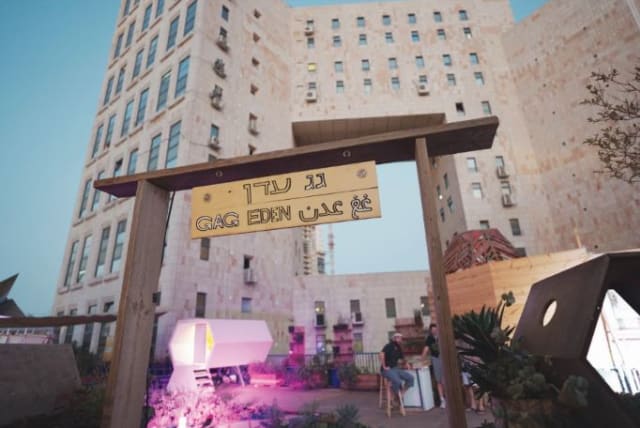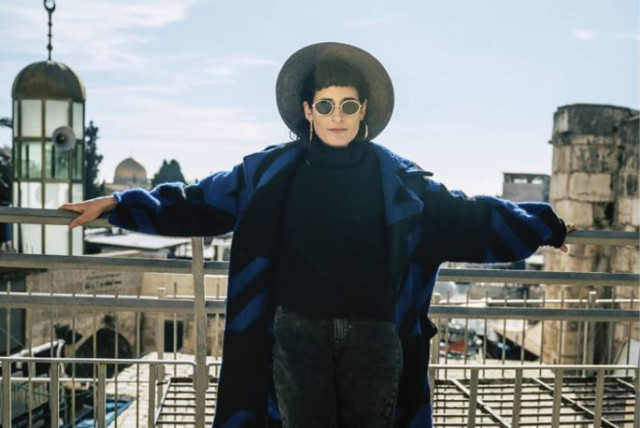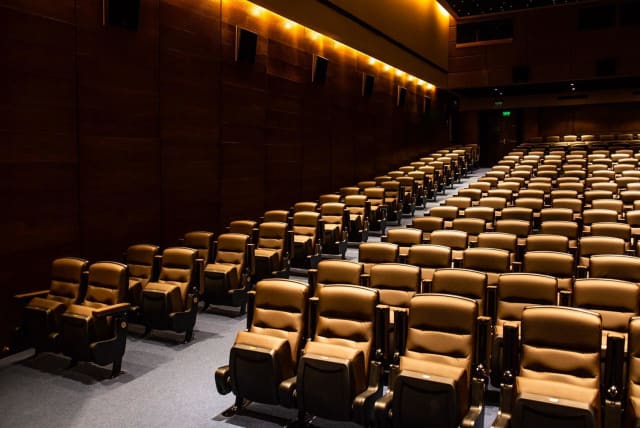Urban living, cities with their vehicle-choked thoroughfares, and all manner of other human-generated polluting substances can be a trying state of affairs. But municipal authorities the world over are increasingly investing effort and – more to the point – money in cleaning up their, and our, act.
In Jerusalem, there is, of course, the light rail cross-city transportation system, the next phase of which is currently under construction. That, presumably, helps to cut down on exhaust fumes. But what happens higher up? (That is not a subtle reference to the upper echelons of society, possibly our highly paid public servants in the Knesset and elsewhere.) That is a vertical take on green matters taken on board some time ago by the folks over at Muslala, located on the uppermost floor of the Clal Center – not, it must be said, one of the capital’s prettiest edifices.
But first looks can sometimes be deceptive. Climb up the cavernous interior of the building on the corner of Jaffa Road and Kiakh Street, passing by pebbledash walls and pillars that must have been dreamed up by a particularly morose architect, and you eventually reach something far more uplifting.
MUSLALA CALLS itself “a laboratory for the study of creative and sustainable urbanism.” The nonprofit, which was founded 14 years ago, does its damnedest to promote ecological and socially accommodating practices through environmental activities and a spread of cultural events. Both those principles are front and center of the third edition of the now annual Gag Eden Festival, which runs at various locations around Jerusalem September 12-14. The title is a play on Gan Eden, “Garden of Eden,” and translates as “Roof of Eden.” Not a bad utopian image to aim for.
The festival is spearheaded by Muslala director and co-founder Matan Israeli, whom I found in a pretty upbeat mood.
“I just came back from a meeting with [Mayor] Moshe Lion,” he chirped.
Seems the pow-wow went well. “I am working with all the various municipal wings. There are budgets and planning support,” Israeli added. The municipality-approved idea is to also ensure that all new public buildings constructed in Jerusalem come equipped with a green roof.
“We are working with the city engineer on that,” Israeli noted.
That augurs well for next week’s festival, for Muslala, and for Jerusalemites who, hopefully, will get cleaner air to inhale and greener, cooler buildings to enjoy. The main premise behind Gag Eden is to develop rooftop agriculture, which offers all sorts of benefits.
First off, there is the invaluable boon of having sources of food close to hand. One of the revelations of the pandemic lockdown era is the need for food security which, when constraints are placed on our freedom of movement, means having vegetables, fruit, and other edibles within reach without running into trouble with the law enforcement folk. There is also the sheer joy of growing what we eat. And having crops, fruit, and foliage proliferating on our building roof means better insulation and, in all likelihood, lower electricity bills.
FESTIVALGOERS SHOULD be able to get a better handle on that and other environmentally nurturing areas, as well as imbibing some of the positive, life-affirming vibes abounding at Muslala if they go along to the Third Rooftop Pioneers Summit, which takes place on September 12 from 8:30 a.m. to 6 p.m.
Mayor Lion will demonstrate his support for the green cause by attending and addressing the audience. City engineer Yoel Even will also free up some time for the conference.
The agenda covers all sorts of avenues to healthier living, both for us and for Mother Earth, with the thematic schedule taking in such talks as “Realizing the Potential of Roofs”; “Planning Roofs in Jerusalem”; “Restoring Nature to the City”; and “Making Rooftop Farming Work.”
The speaker roster features professionals from here and abroad, with the foreign contingent including renowned Italian architect Stefano Boeri, who created the feted Vertical Forest high-rise in Milan.
Israeli has plenty of models to replicate and learn from around the world, including the Brooklyn Grange project in the US, co-founded by CEO Ben Flanner. Happily, Flanner is flying over here to share some of his experience and wisdom with us at the conference. And there will be more Stateside insight on offer at a talk by architect Gilat Levinger from the Faculty of Architecture and Town Planning, of the Technion in Haifa.
Israeli is looking forward to taking in some of the gen from the specialists and hopes we will all leave the conference, and the festival, suitably fired up to start or continue efforts to make our surroundings more sustainable and habitable.
“Stefano [Boeri] will talk about his passion for all things green,” said the Muslala head. “We can all learn from him. His tower in Milan, with all the trees, reduces temperature and absorbs carbon.” Sounds like a breath of fresh air.
The benefits of large-scale urban farming
MEANWHILE, FLANNER will advise us of the carbon footprint and financial and convenience benefits to be had from his large-scale urban farming endeavor.
“Brooklyn Grange brings the food closer to the consumers,” said Israeli.
There are some socioeconomic rewards in there too. “Thirty percent of the food they grow is given to socioeconomically disadvantaged people. It is a sound economic model, too.”
There is much to take on board at the third annual summit of green-thinking professionals which can, and should, impact the way we live, build, and plan. There will be some input from down the road, when Sustainable Planning Coordinator of the Municipality of Tel Aviv-Jaffa Noa Hollander makes her presentation on “The Activity Plan for Beneficial Roofs in Tel Aviv-Jaffa,” while local municipality official Miri Reiss, who heads the Jerusalem Environment Authority, will address the topical and pressing matter of “The Roof in an Age of Overcrowding of Climate Change.”
Installing solar panels and the socioeconomic advantages thereof will also be discussed, as will environmentally friendly solutions for open public areas courtesy of Sharon Plotenitsky from the Environmental Protection Ministry.
Nir Barak from the Department of Politics and Government, School of Sustainability and Climate Change, Ben-Gurion University of the Negev, will also offer some enlightenment from foreign climes. Barak’s slot takes place over at the Bezalel Academy of Arts and Design building – naturally, on the roof, at 6 p.m. on September 13.
Barak has a particular interest in an Austrian gent named Friedensreich Hundertwasser and will impart some of the late Jewish-born artist and environmental activist’s philosophy. “This article analyses and interprets the works of Friedensreich Hundertwasser as a source of inspiration for environmental ethics and offers an extended model of the Ecological Self based on an interpretation of his works,” Barak notes in a paper he authored that serves as the basis for his Gag Eden discourse.
Hundertwasser was way ahead of his time, says Barak, and did not receive the acclaim he deserved.
Mind you, that has been somewhat rectified, as the Kunst Haus Wien – Museum Hundertwasser in Vienna has gained in popularity in recent years, drawing tourists from all over the world. The museum is a joy for all the senses, with irregularly shaped walls and ceilings, and uneven floors keeping the visitor keenly aware of their surroundings. The explosion of polychromic glory of the building exterior is also a sight for sore eyes.
Barak hopes that some of that eventually seeps into Israeli consciousness and, subsequently, into town-planning thinking. Mind you, he is not exactly holding his breath.
“Everyone now understands that building nature-based solutions are critical now. Academics and global architecture thinkers all get that. Whether that will eventually find its way into official policies is another story. There is still a long way to go with that.”
The Austrian took a left-field approach to architecture and enjoyed lobbing the odd curve ball into the officialdom arena. “He said he was an amateur architect and that he liked to do things differently.” Barak explains that Hundertwasser was not looking towards preserving his own singular legacy and seeing his name up in lights.
“He said ‘everyone must be creative’ and that we shouldn’t do ‘Hundertwasser.’ He said we should do our own thing, in our own way.”
Does that mean we can adapt his humanistic and environment-friendly teachings to this part of the world?
Barak suggests that is something of a yes-no scenario. While the tenets of the Austrian’s free-flowing approach to life, and the aesthetics that inform the quality of our existence on terra firma certainly hold true here, he says it is more a matter of embracing the concept and running with any and every individual which way.
“I wouldn’t say ‘Let’s build Hundertwasser in Israel.’ I’d say ‘Let’s build Matan Israeli or Barry Davis or Nir Barak in Jerusalem.’ We can try to do Hundertwasser here, but it would never come out the same.”
Which is just the way it should be. Architecture is a very local thing by nature. Yes, you can replicate, say, neo-Gothic church designs, or neo-Roman facades on public buildings, but that misses the locally suited point. “Many people tried to copy Hundertwasser but it came out nondescript,” Barak observes.
It would be nice to walk along, say, the section of Jaffa Road between the shuk and King George Street and having our constitutional brightened by architectural items that spark the imagination and fuel thoughts of phantasmagorical climes, while promoting a cleaner and more sustainable lifestyle. That would put a spring in any Jerusalemite’s step.
ADI SEGAL also contributes to the aesthetic and philosophical festival credo with a baker’s dozen prints in her “Lady Beekeepers” photography exhibition at Muslala.
Her show features shots of Palestinian women from east Jerusalem who, for the past couple of years, have been cultivating beehives on the roofs of their own buildings. The program helps to empower local women while providing them with some extra revenue. Some of the honey they produce will be on sale at Muslala during the festival and, no doubt, will find its way to some Rosh Hashanah family dinner tables.
“There are 130 women on this program,” Segal said. “It helps them financially and increases their independence.” The idea is also to intervene with the natural process as little as possible.
“The women only take 30 percent of the honey. I think that doesn’t disturb the bees too much,” she suggested. “You know, if you use coconut oil that has been shipped over from the other side of the world, that isn’t too environmentally friendly.” Duly noted.
Segal said that despite having dabbled in beekeeping herself in the past, she has had the odd scary encounter while documenting the beekeepers’ work. “I got stung on the head once,” she recalled. “The bees were let out, and I think they were very hungry and anxious. They headed straight for me. But it wasn’t too bad,” she added with a laugh.
This is Segal’s first photographic foray of this kind. She started snapping the Palestinian women in June last year and said she has had to nurture a sense of trust to get the pictures she wants.
“I am really happy about this collaboration. I don’t take it for granted at all. The women couldn’t at first, understand why I photographed them between their apiary activities. There is always the need for some fine-tuning.”
Sounds like a healthy, balanced ecological line to follow too, and it is one that Israeli and his cohorts are keen to convey to us all. He would like us to take a look up more frequently instead of burying our faces in a cellphone screen or perusing the contents of store display windows.
“There are plenty of organizations that engage in the ground,” he said. “What we are interested in is roofs, which nobody considered before us. There is so much potential on roofs. The more crowded cities get, the more important the roofs become.”
There will be other cultural and artistic items over the three days, with Inbal Dekel-Goldberg leading an alternative Rosh Hashanah-themed ceremony-performance called In the Eyes of City and Man, with an eclectic cast that includes musician Maya Linik, poet-musician Yonatan Kunda, culinary artist Chen Koren, and former Black Panther Reuven Abergil. “They will bless Jerusalem and the people that live in this city,” Israeli explained.
There will also be some quality musical entertainment, with the likes of Yael Deckelbaum, who joins forces with groove outfit Sandman Project, while Ethiopian-Israeli duo vocalist Tamar Rada and saxophonist-vocalist Abate Berihun add to the festival’s ethnic and disciplinary stretch. v
For more information: https://muslala.org








































































































